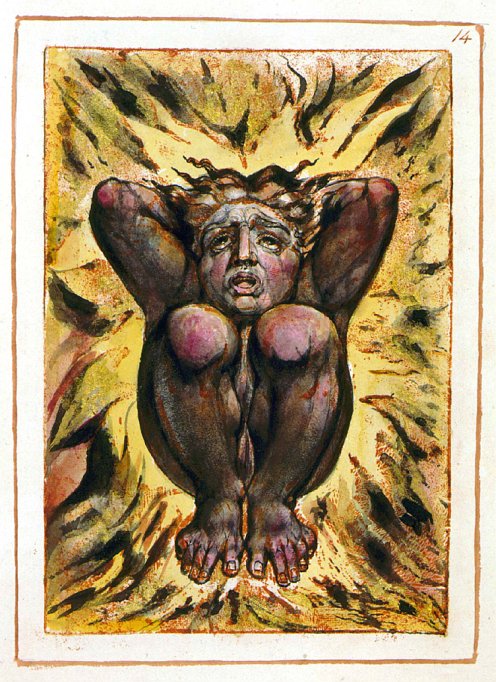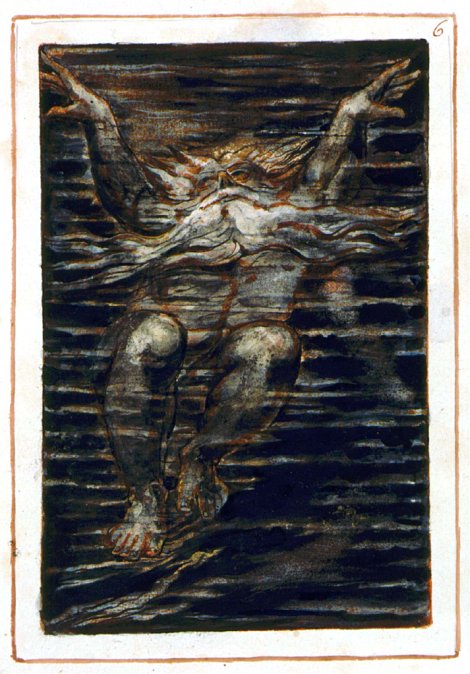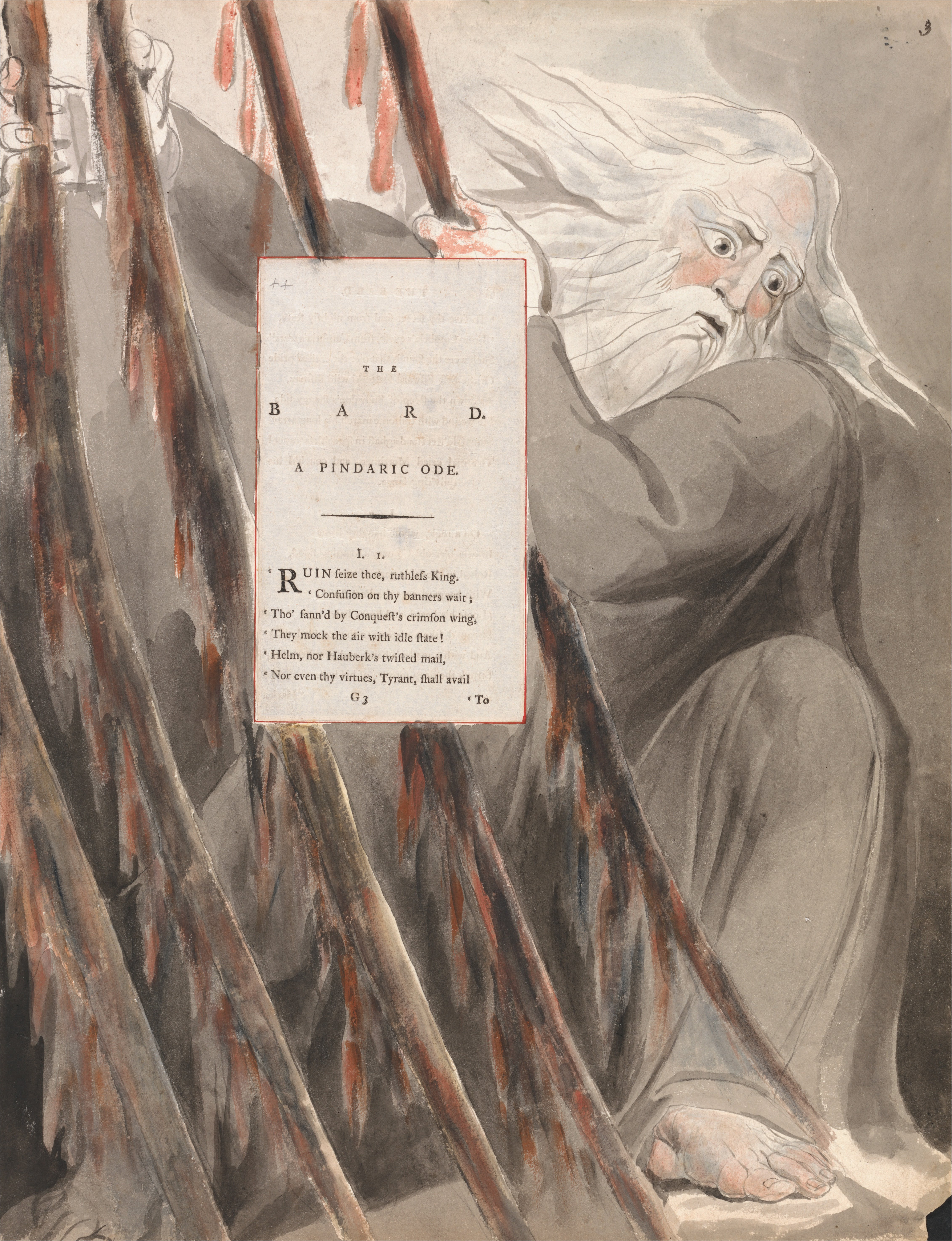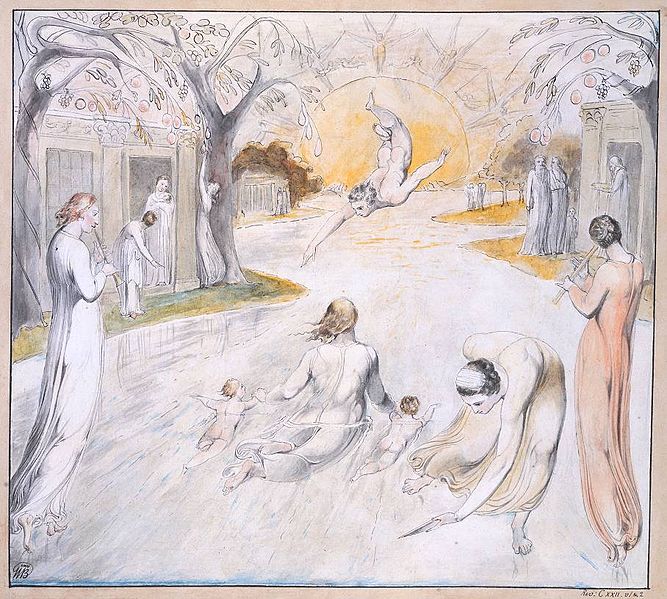First posted Dec 2015
Book of Urizen: full page images of the Four Elements.
For the Sexes: Gates of Paradise, THE KEYS, (E 268)
Four Zoas, Night II, Page 30, (E 319)
"Then rose the Builders; First the Architect divine his plan
Unfolds, The wondrous scaffold reard all round the infinite
Quadrangular the building rose the heavens squared by a line.
Trigon & cubes divide the elements in finite bonds
Multitudes without number work incessant: the hewn stone
Is placd in beds of mortar mingled with the ashes of Vala
Severe the labour, female slaves the mortar trod oppressed
Twelve halls after the names of his twelve sons composd
The wondrous building & three Central Domes after the Names
Of his three daughters were encompassd by the twelve bright halls
Every hall surrounded by bright Paradises of Delight
In which are towns & Cities Nations Seas Mountains & Rivers
Each Dome opend toward four halls & the Three Domes Encompassd
The Golden Hall of Urizen whose western side glowd bright
With ever streaming fires beaming from his awful limbs
Water - Tharmas Four Zoas, Night IV, Page 52, (E 334)
"I will compell thee to rebuild by these my furious waves
Death choose or life thou strugglest in my waters, now choose life
And all the Elements shall serve thee to their soothing flutes
Their sweet inspiriting lyres thy labours shall administer
And they to thee only remit not faint not thou my son
Now thou dost know what tis to strive against the God of waters
So saying Tharmas on his furious chariots of the Deep
Departed far into the Unknown & left a wondrous void
Round Los. afar his waters bore on all sides round. with noise
Of wheels & horses hoofs & Trumpets Horns & Clarions
Terrified Los beheld the ruins of Urizen beneath
A horrible Chaos to his eyes. a formless unmeasurable Death"
Earth - UrhonaFour Zoas, Night IX, Page 136, (E 404)
"Forsaken of their Elements they vanish & are no more
No more but a desire of Being a distracted ravening desire
Desiring like the hungry worm & like the gaping grave
They plunge into the Elements the Elements cast them forth
Or else consume their shadowy semblance Yet they obstinate
Tho pained to distraction Cry O let us Exist for
This dreadful Non Existence is worse than pains of Eternal Birth
Eternal Death who can Endure. let us consume in fires
In waters stifling or in air corroding or in earth shut up
The Pangs of Eternal birth are better than the Pangs of Eternal Death Milton, Plate 31 [34], (E 130)
"And all the Living Creatures of the Four Elements, wail'd
With bitter wailing: these in the aggregate are named Satan.
And Rahab: they know not of Regeneration, but only of Generation
The Fairies, Nymphs, Gnomes & Genii of the Four Elements
Unforgiving & unalterable: these cannot be Regenerated
But must be Created, for they know only of Generation
These are the Gods of the Kingdoms of the Earth: in contrarious
And cruel opposition: Element against Element, opposed in War
Not Mental, as the Wars of Eternity, but a Corporeal Strife
In Los's Halls continual labouring in the Furnaces of Golgonooza"
Blake states
that the Four Zoas are the 'Four Eternal Senses of Man.' At the
Eternal level Albion incorporates all of the created world; his
senses are the Zoas. When Albion splits and falls the Eternal
Senses become the Elements which are expressed as forces which
are active in defining the natural world. The raw power of the
elements breaks forth in the destruction of the Whirlwind,
Flood, Earthquake and Fire. Milder but no less insidious
formulations of the Elements are the Fairies, Nymphs, Gnomes
& Genii, unconscious instruments which instigate strife and
war among political entities, whether they be families,
religions, political parties, or nations. The elements have
become the masters of man rather than his servants.Mankind would like to be free from subjugation to the results of the conflicts manifesting in nature and politics, but the powers that sustain them go unrecognized. If we knew that we have Eternal Senses capable of enjoying the infinite and eternal panoply of the universe, we would relinquish our grip on the partial to perceive the whole.
Jerusalem, Plate 32 [36], (E 178)
"And the Four Zoa's clouded rage East & West & North & South
They change their situations, in the Universal Man.
Albion groans, he sees the Elements divide before his face.
And England who is Brittannia divided into Jerusalem & Vala
And Urizen assumes the East, Luvah assumes the South
In his dark Spectre ravening from his open Sepulcher
And the Four Zoa's who are the Four Eternal Senses of Man
Became Four Elements separating from the Limbs of Albion
These are their names in the Vegetative Generation
[West Weighing East & North dividing Generation South
bounding]
And Accident & Chance were found hidden in Length Bredth & Highth
And they divided into Four ravening deathlike Forms
Fairies & Genii & Nymphs & Gnomes of the Elements.
These are States Permanently Fixed by the Divine Power
The Atlantic Continent sunk round Albions cliffy shore
And the Sea poured in amain upon the Giants of Albion
As Los bended the Senses of Reuben Reuben is Merlin
Exploring the Three States of Ulro; Creation; Redemption. & Judgment
And many of the Eternal Ones laughed after their manner".











.jpg/600px-Jerusalem_The_Emanation_of_The_Giant_Albion%2C_copy_E%2C_object_62_(Bentley_62%2C_Erdman_62%2C_Keynes_62).jpg)